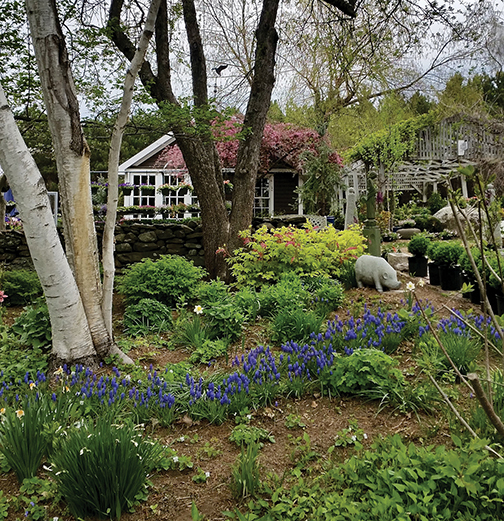 Few gardeners willingly accept defeat when they see their beautiful flower gardens nibbled to the ground by hungry deer and other wildlife. Without exception, central Maine gardening experts said most deer will eat anything if they’re hungry enough. When spring weather produces the first tasty buds and green shoots, the deer will find their way to the nearest outdoor buffet.
Few gardeners willingly accept defeat when they see their beautiful flower gardens nibbled to the ground by hungry deer and other wildlife. Without exception, central Maine gardening experts said most deer will eat anything if they’re hungry enough. When spring weather produces the first tasty buds and green shoots, the deer will find their way to the nearest outdoor buffet.
Instead, these plant experts suggest gardeners shop for deer-resistant varieties of annual and perennial flowering plants.
Ellen Withee at Boynton’s Greenhouses on Madison Avenue in Skowhegan said “Deer tend to avoid strong fragrances, irritating textures and unpleasant tastes. Some people find blood meal works, but that really stinks.”
Fortunately, many gardeners’ favorites, including lupine, foxglove, poppy, and coneflower, aren’t a deer’s first choice. Lavender offers both the woody texture and strong scent that makes it a less desirable snack.
At Sunset Flowerland & Greenhouses in Fairfield, Catherine Hebert hears lots of sure-fire methods for keeping four-legged critters at bay.
“One that seems to be popular is hanging aluminum pie plates from a string,”she said.“The deer are startled when they blow in a breeze or when the sun reflects off them.”
In May, when she and her staff open their greenhouses to sell plants, they keep a long list of deer-deterring flowering perennials and annuals they happily share with customers. She said deer don’t like pachysandra, peonies, salvia, yarrow or flowering onions.
“They also don’t like coreopsis, snapdragons, marigolds, Siberian iris or Shasta daisies,” she said. “But they will eat most anything when they’re hungry.”
Steve Jones of Fieldstone Gardens in Vassalboro said deer don’t often bother ornamental grasses. Artemisia, known by the more common name Dusty Miller, is easy to grow and not popular with the four-legged creatures. Many native plants do well in local landscapes, also.
“Ferns, in general, aren’t preferred by deer,” he said.
Rena Dodge, of Black-Eyed Susan’s Greenhouses in Augusta, said deer love to eat leafy vegetation, and hostas are a favorite. She offered some low-cost solutions that have been reliable.
“I have found that using human hair wrapped in cheese cloth and tied around my gardens has helped deter deer,” she said.
She also suggested tying empty cans to fishing line and setting them on upside- down buckets around the garden. Attach the line to posts to make an invisible fence.
“When deer bump the line, the cans fall and scare them away,” she said. “I have had great success with this simple trick.”
Robin Jordan, owner of Robin’s Flower Pot in Farmington, said her customers have reported good luck with PlantSkyyd, which is a topical repellent. “People seem to have good results,” she said.
Applied as a spray or as shake-able granules, the product is a deterrent to deer, rabbits, voles, chipmunk, squirrels, and woodchucks, and it’s rain-resistant, so there’s no need to re-apply after every rainfall. Since it’s a certified organic product listed by the Organic Materials Review Institute, it also can be used in vegetable gardens, on fruit trees and food crops.
Gabriel Pratt, owner of Pratt’s Family Greenhouse in Newport, said cleome has little thorns, which deer don’t like.
“They also don’t like the smell of some herbs, like garlic,” he said.
He suggested gardeners could mix some of those strongly scented herbs, including rosemary and chives, with some of the more vulnerable flowering plants.
Hillary Alger, a Flower Product Manager at Johnny’s Selected Seeds, said customers can find at Johnny’s all the seeds for deer-resistant annuals and perennials, including lavender, foxglove, lupine, marigolds. yarrow, poppies, echinacea, ageratum and columbine.
Send questions/comments to the editors.



Comments are no longer available on this story